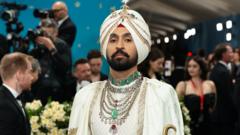A breakdown of expert opinions on the optimal song styles, staging simplicity, key choices, and unique twists that could lead an entry to victory at Eurovision.
**Mastering Eurovision: Expert Insights on Winning Strategies**

**Mastering Eurovision: Expert Insights on Winning Strategies**
Understanding the key elements that lead to success in the Eurovision Song Contest.
The quest for Eurovision glory is one that captivates millions across Europe and beyond, with about 163 million viewers tuning in to watch the contest unfold last year. There's a plethora of perspectives on what sets apart a winning entry, sparking debates among fans. Should performers choose a heartfelt ballad that resonates emotionally with audiences or a vibrant, theatrical spectacle that dazzles with elaborate sets and costumes?
According to Joe Bennett, a musicologist at Berklee College of Music, a successful Eurovision entry tends to fall into two distinct categories. The first is known as the "Euro-banger," characterized by upbeat tracks exceeding 120 BPM, primarily featuring kick drums and synthesizers. Hits like Sweden’s Euphoria (Loreen, 2012) and Heroes (Måns Zelmerlöw, 2015) exemplify this style. The second major category is the slow ballad, often around 70 BPM, as showcased by Portugal’s Amar Pelos Dois (Salvador Sobral, 2017) and the Netherlands’ Arcade (Duncan Laurence, 2019).
Despite a common belief that Eurovision songs are largely about themes of love and harmony, Bennett suggests they usually align with six key lyrical themes: love, unity, self-assertion, party anthems, historical narratives, and songs celebrating music. Notably, tracks focusing on self-empowerment tend to resonate strongly with audiences, a trend epitomized by Conchita Wurst’s powerful anthem Rise Like a Phoenix, which won the contest in 2014.
While it’s tempting for artists to opt for extravagant performances complete with elaborate staging, writers like Thomas Stengaard (co-writer for Denmark’s 2013 winning song, Only Teardrops) advise simplicity in presentation. Stengaard notes that memorable performances can stem from straightforward staging that’s easy for viewers to visualize. Vocal coach Carrie Grant, who achieved a sixth-place finish in Eurovision, concurs that excessive embellishments may detract from the performance itself.
Musical composition also plays a critical role in Eurovision success, with growing evidence favoring songs in minor keys. In 2023, approximately 85% of finalists performed in these keys, suggesting a trend toward deeper emotional resonance rather than traditional associations of major keys with happiness. Despite this, Remember Monday’s entry for the UK has opted for a major-key composition to differentiate itself from the crowd.
Surprises are another essential ingredient in crafting a winning Eurovision song. Repetition can help songs stick in listeners' minds, but it should be strategically paired with unexpected twists. A classic example is the UK’s 1981 winner Bucks Fizz, known for its iconic costume reveal, which combines musical intrigue with visual shock.
Overall, experts stress the importance of catchy melodies and appealing choruses, reiterating that effective Eurovision songs should be designed for sing-along potential across diverse audiences. With unique twists and surprises being crucial to stand out in the contest, songwriters continually face the challenge of finding ways to enthrall viewers in an environment where all eyes are eager for creativity and originality.





















